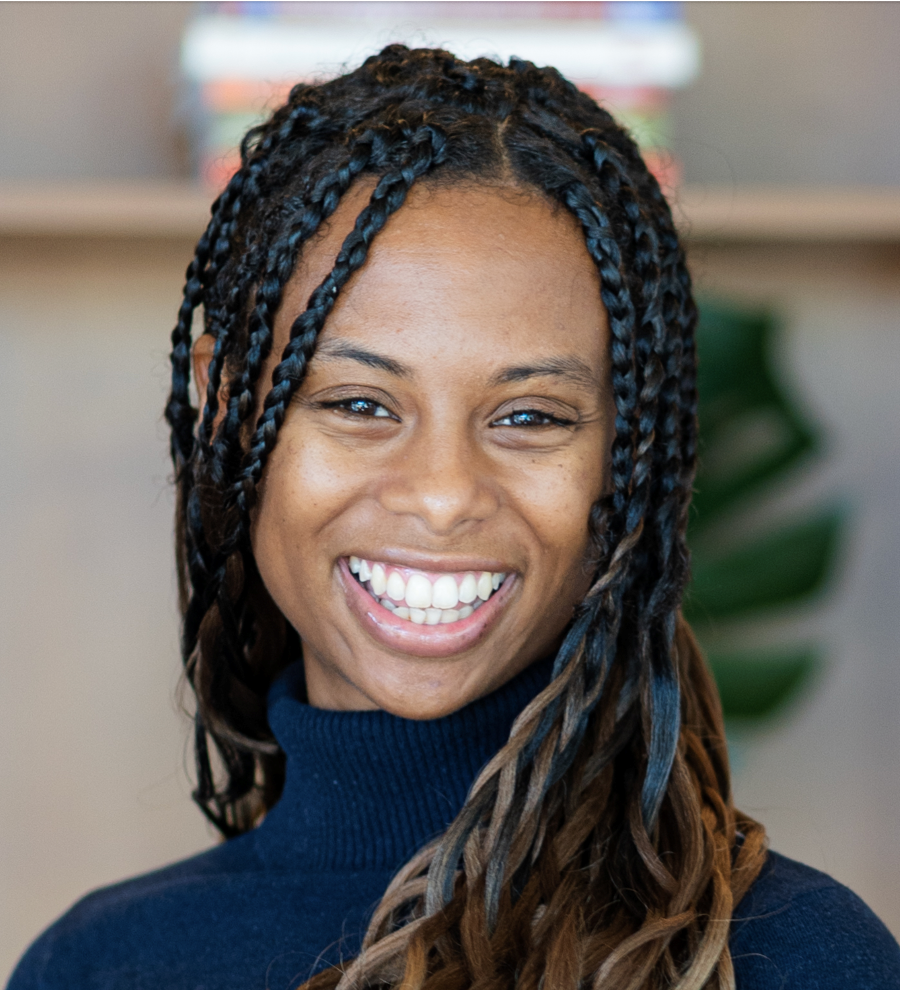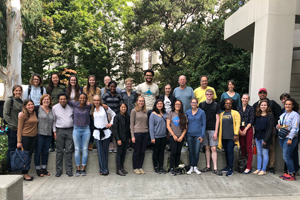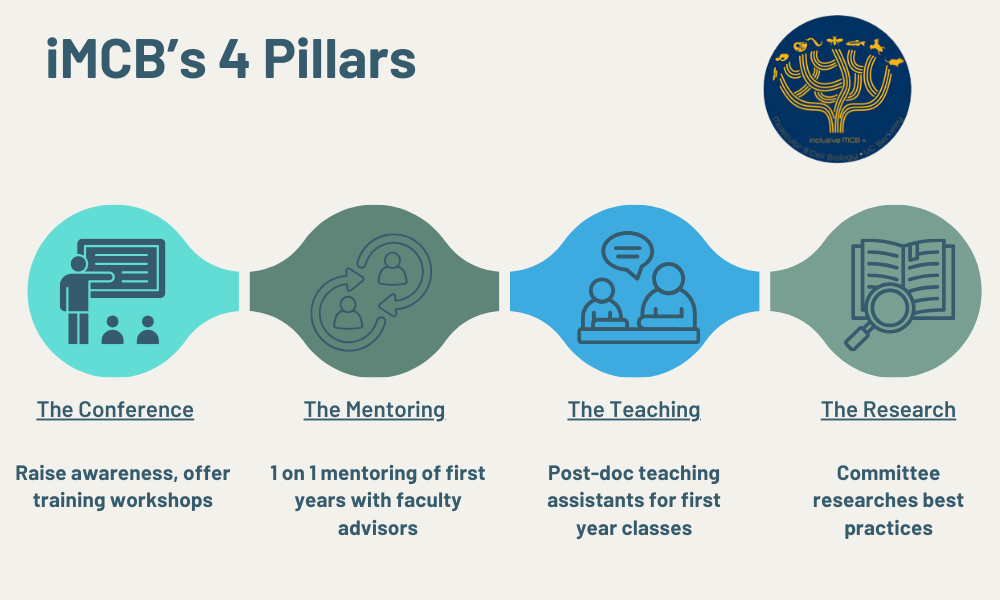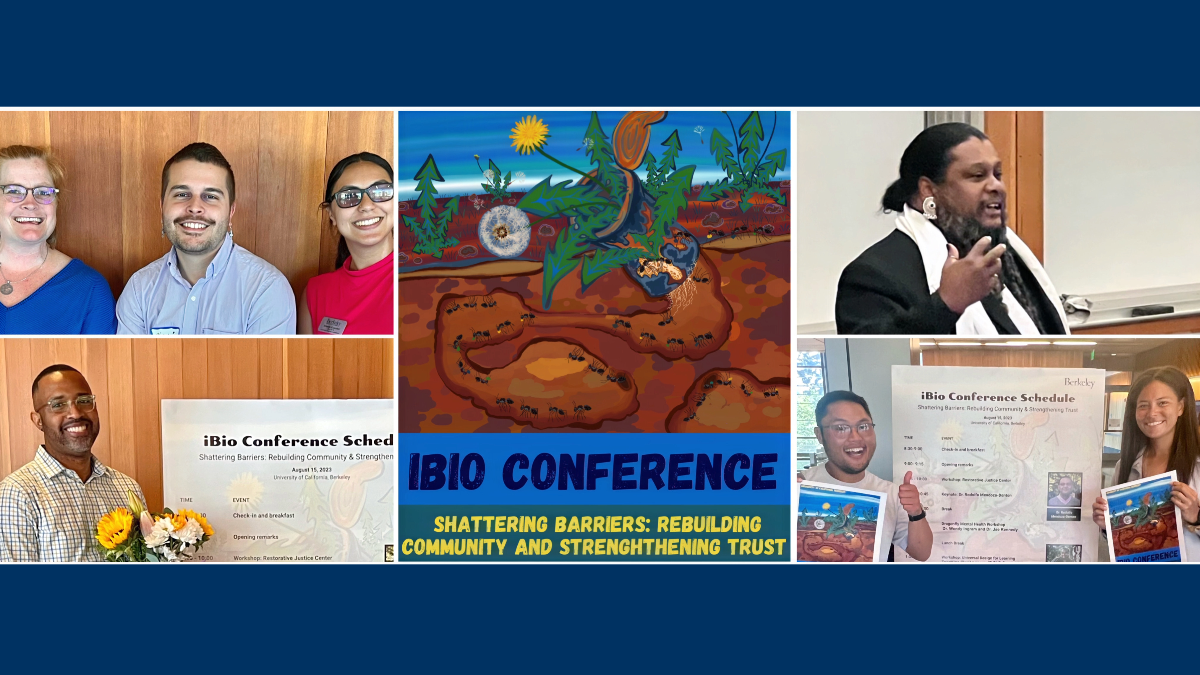
On the evolution of iBio from iMCB
By Héctor L. Torres Vera
I joined MCB in 2020 amidst the peak of the COVID-19 pandemic. Masked, excited, and scared, I traveled from humidity and heat-laden Puerto Rico to the foggy, orange-skied Berkeley (wild fire times) back then. The decision to join Berkeley came easily to me—the scientific pursuits of the faculty were outstanding, and the graduate student community was warm and welcoming. However, the true standout for me was the determination in the community to develop initiatives to make Berkeley a better place for all.
One initiative that made its mark was inclusive Molecular and Cell Biology (iMCB), a graduate student-led group focused on promoting diversity, equity, inclusion, and belonging (DEIB).
Today, iMCB has shapeshifted, joining forces with the Integrative Biology department to form a larger initiative: inclusive Biology (iBio).
This retrospective will look at iMCB's history, its continued journey, and its ongoing mission as iBio to introduce evidence-based strategies for improving diversity, equity, and a sense of belonging on campus. We will also hear from key figures about their experiences and thoughts on the initiative.
A drop makes waves

The iMCB initiative was founded in 2017 by Dr. Lisa Eshun-Wilson, an alumna of MCB’s PhD program who was advised by Professor Eva Nogales and is currently a National Science Foundation Postdoctoral Fellow in the lab of Dr. Gabriel Lander at The Scripps Research Institute in La Jolla, CA. Eshun-Wilson launched iMCB to enhance every student's sense of belonging. She believed that implementing evidence-based, sustainable strategies to improve campus diversity, equity, and inclusion efforts could transform the institutional culture and alleviate the diversity tax on marginalized students."DEI work is not just for people of marginalized backgrounds,” she emphasized, “it's really for everyone. It needs to be central to any program because it reflects leadership. How you treat your most vulnerable groups reflects your values."
The beginnings of iMCB were inspired by Eshun-Wilson’s studies in science and policy and first-hand experiences in initiatives in her community in Los Angeles, such as the Big Brothers Big Sisters Program and the Fulfillment Fund. “I could stitch together all the best aspects of these programs to develop this new program at Berkeley,” she explains. Initially, she drafted a curriculum for the first-ever iMCB conference in 2018, inspired by conversations with Professors Claude Steel of Stanford University and Rudolfo Mendoza-Denton, a leader in the Psychology Department at UC Berkeley.
After the first iMCB conference, the event was institutionalized and adopted into the New Graduate Student Orientation Week. Carina Galicia, Assistant Director of Student Services, and Hannah Bloom, MCB Graduate Student Advisor became a recurring and crucial backbone for the organization. Their work is pivotal to the continuation of iBio to this very day.

Eshun-Wilson also worked closely with department staff and leadership to ensure iMCB would become a cornerstone of the department’s DEIB efforts, such as the Chair of the Equity Committee, the MCB Equity Advisor, the Biological Sciences Graduate Diversity Director, Deans, and faculty. From grant writing to fundraising to speaking at faculty meetings, Eshun-Wilson was determined to see iMCB become a cultural mainstay in the department. She believes that “if you want to bring more diverse individuals into the program, you must have the infrastructure to support them.”
All these measures were monumental for MCB and remain relevant for the department’s future.
According to the National Science Foundation’s latest report, Black, Hispanic, American Indian, and Alaska Native and people with disabilities broadly remain underrepresented in science, technology, engineering, and mathematics compared to their overall distribution in the U.S. population. Even more worrisome, the representation of people with disabilities in the STEM workforce (only 3%) has remained unchanged from a decade ago.
It takes a village
Throughout the following year, Eshun-Wilson began working closely with then-graduate student Dr. Michelle Reid to further the reach of iMCB. Reid was a PhD student in Professor Stephan Brohawn’s lab and is currently an Environmental Scientist at CalRecycle. Reid reflected on this period: “We wanted to build upon Eshun-Wilson’s foundation and take iMCB to the next level. We designed programs, collected data, made surveys, recruited students, and met with the students and those who volunteered to teach or mentor. We were doing it all."
How were Reid and Eshun-Wilson doing all of this in the nuanced context of graduate school? Understanding the complexities of any given academic department was crucial. “We had to integrate all of these different inputs—staff, faculty, trainees, students— and then synthesize them to have very clear outputs,” explained Reid. Together with Eshun-Wilson, they set the groundwork for iMCB by negotiating, strategic planning, and curriculum building. Their work was vital to ensure the lasting presence of iMCB.
As time passed, the leadership torch was passed to Reid and Dr. Kyle Tucker, who also worked on his thesis with Professor Brohawn and is currently a Research Scientist at Septerna. Under this new leadership, iMCB continued to thrive, expanding its reach and influence. Reid and Tucker built on the foundation of iMCB, focusing on using evidence-based approaches to create a supportive climate for all trainees.
Tucker explained, "It always started with papers and data—iMCB took a lot from research. We had a research group who would help inform how we’d design programs.” One such program was the First Year Mentorship initiative, in which graduate students of the entering class were paired with a faculty mentor (in addition to their rotation advisors) and met regularly to discuss the student’s perspectives and experiences during their first year.

This approach would prove invaluable, as it was empirical. Tucker explained that the research group “ensured we had developed measurable outcomes before implementation.” The resulting data would further prove why iMCB was essential and bring more buy-in from different university resources.
Reid elaborated further, “We were also very hypothesis-driven. We could contrast existing programs, whether we've participated in them or read about them, because we were generally very interested in what made them successful.” Using this hypothesis-based approach, they could experiment with iMCB’s programs, collect data, and use it as feedback to improve the programming. One shining example of this was the iMCB Affinity Groups program.
Spearheaded by Michelle Reid and fellow graduate student Madeline Arnold, the iMCB Affinity Groups aimed to address a community need shared in the 2019 iMCB feedback survey for personal growth and DEIB-related community building.
The pilot involved single-session affinity group discussions, encompassing over 14 identities, spanning over 34 discussions the following year. Feedback revealed that 87% of the 167 participants found the program moderately to very impactful, with a notable positive impact on participants' sense of belonging. Furthermore, for underrepresented minorities (URM) in science, the impact was statistically significantly higher (94% moderately to very impactful). This success led to recognition and funding, including the Dean's Diversity Innovation Fund, making the Affinity Groups program the first long-term initiative to foster cross-department collaboration, attracting over one hundred participants from diverse STEM graduate programs. These programs included Chemistry, Neuroscience, IB, Physics, Chemistry and Chemical Engineering, and Biophysics.
"(The program) helped me feel more comfortable in science. I realized that there were other people with very similar upbringings in communities similar to my own.” -Response from the iMCB Affinity Groups feedback survey
The high standard Eshun-Wilson, Reid, and Tucker fomented in the program resulted in four main components: the annual conference, an aforementioned first-year mentoring program, a post-doc teaching assistant program, and the research group. Each of these was developed and managed by a team of over 20 graduate students, post-docs, and staff that would assure the continuing success of the program’s goals. An additional assessment team ensured feedback was considered at every step of the programming process.
This large group of people were committed. Throughout the program, Reid noted that ”everyone held themselves to a very high ethical standard.” Tucker, alongside MCB graduate students Madeline Arnold, Michael Ly, and Hannah Weaver, modeled iMCB’s standards of ethics based on the best available resources, such as UC Berkeley’s Internal Review Boards for research on human subjects.
Two departments are better than one
The transformation from iMCB to iBio marked a pivotal moment in the initiative's history, especially in championing diversity, equity, and inclusion. Fusing with the Department of Integrative Biology's initiative, inclusive IB (iIB), brought together two influential forces, creating a synergy that promised even more excellent opportunities for promoting a diverse and inclusive scientific community.
The first inaugural conference of iBio, in 2022, was spearheaded by a team of graduate students—Sara Herrejon Chavez, Jessica Aguila, Valeria King, Khansaa Maar, Jaemin Lee, and myself— and staff Monica Albe, graduate student services advisor for the Department of Integrative Biology, Carina Galicia, and Hannah Bloom. This year’s conference brought on graduate students Alyssa Gimenez and Taormina Lepore and professors Ellen Lumpkin and Diana M. Bautista.

The team also recently welcomed Aubrey Green, DEIB Program Manager for the MCB department, who joined the department just a few months ago. He will be working to support the department in building an inclusive culture by focusing on programming and opportunities that help us recognize, engage, and benefit our MCB community members.
Green is a much-welcome addition to the iBio team, as initial conversations with the iMCB team foretold the necessity of such a role in the Department. "You need a staff member because one size does not fit all. Each department has different needs.” Eshun-Wilson reminisced on her senior thesis work at Grinnell College. She emphasized that “it's very important to have these departmental figures– they help decentralize power by complementing the centralized existing infrastructures. That's how you get true, sustainable, strong leadership."
This year marked the second annual iBio conference, a testament to the initiative's growth and success, especially in advancing diversity, equity, and inclusion within the scientific community. The conference brought together students across all the MCB divisions in the spirit of learning and kindness. Keynote speakers Professor Rudolfo Mendoza-Denton and Professor tyrone B hayes shared research and personal experiences regarding DEIB, and student organizer Lepore guided a Universal Design for Learning workshop.
The evolution of iBio, from its inception within iMCB to its current collaboration with iIB, is a testament to its founders’ and leaders’ passion, dedication, and vision, consistently championing diversity, equity, and inclusion. In scientific research and academic pursuits, initiatives and organizations often arise from the vision and determination of passionate individuals. Eshun-Wilson, Reid, and Tucker’s efforts reflect the transformative power of initiatives that unite like-minded individuals with a shared commitment to making academia more inclusive and equitable.
As iBio continues to grow and thrive, it remains focused unswervingly on diversity, equity, and inclusion. It serves as a reminder that remarkable things can happen when passionate individuals come together to ensure everyone has a seat at the table. The future of iBio is bright. Student leaders of the past leave a rich, meaningful legacy that promises even greater achievements and contributions to our community in the future.
Stay tuned for more upcoming news regarding next year’s iBio conference and new, exciting programming. If you want to contact Aubrey Green to learn more about iMCB or iBio, discuss MCB DEIB-related topics, or get involved, book an appointment here.
Lastly, in the words of Isaac Newton, "If I have seen further [than others], it is by standing on the shoulders of giants.” In this spirit, we thank the trailblazers of iMCB, and commend them for their work, consideration, and kindness.
Assessment Team: Hannah Weaver (Lead), Kyle Tucker (co-lead), Michael Ly, Madeline Arnold, Mark Stepaniak, Alicia Gowans
Mentoring Team: Valerie Vargas-Zapata (Lead), Cara He, Anna Rogers, Emilio Soto Soto
Research Group: Danielle Spitzer (Lead), Molly Brothers, Amanda Gonzalez (lead), Sonali Mali, Maia Reyes, Anthony Rodriguez-Vargas, Sophia Friesen, Tess Branon, Christiane Voufu, Adriana Mendizabal, Kent Gorday, Maura McDonagh
Postdoc Liaisons: Adam Yokom (co-lead), Katheleen Pestal (co-lead), Jessica Witchley, Gabrielle Sterne, Flora Rutagarnia, Tina Sing, Coral Zhou, Suifang Mao, Michael Tellas, Thomas Graham
MUGS (Mentoring for Undergraduate and Graduate Success): Adam Yokom (co-lead), Coral Zhou (co-lead), David Kern (co-lead), Jesse Castillo, Ellen Lumpkin
Conference Team: Michael Ly (co-lead), Hannah Nilsson (co-lead), Madeline Arnold (co-lead), Tram Nguyen
Affinity Groups: Madeline Arnold (co-lead), Hannah Nilsson (co-lead), Kyle Tucker (co-lead), Michelle Reid (co-lead), Michael Ly, Lorena Grundy, Dariya Bakshinskaya, Frankie Cunningham, David Emory Brown, Madeline Klinger.
Banner image credit Sara Herrejon Chavez
Back to Main Fall 2023 Newsletter Page
| Connect With Us! | ||||
 MCB X (formally Twitter) |
 LinkedIn Postdocs, PhDs, or Undergrads |
 Cal Alumni Network |
 Give to MCB |
|
